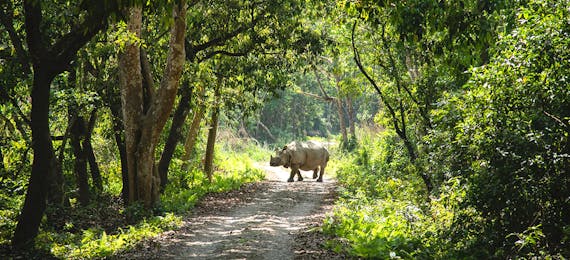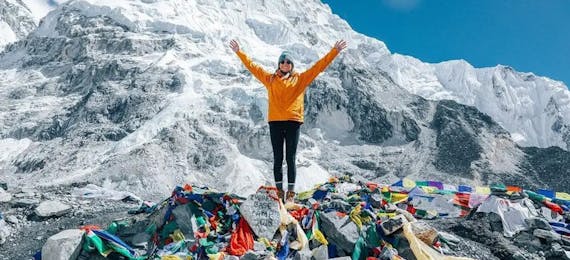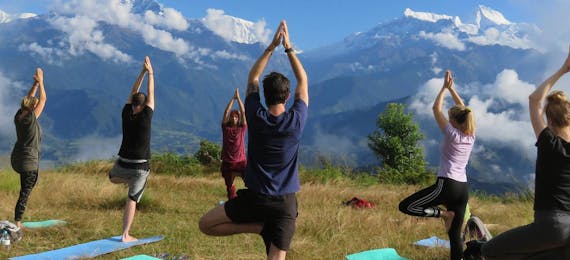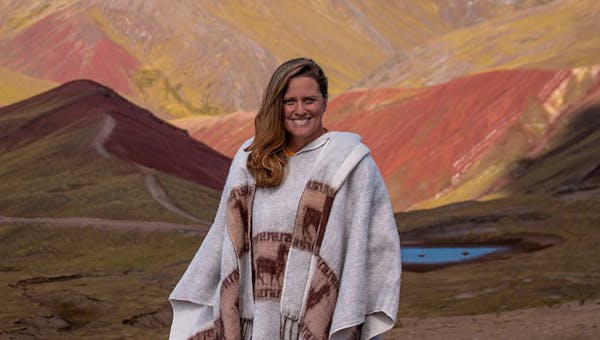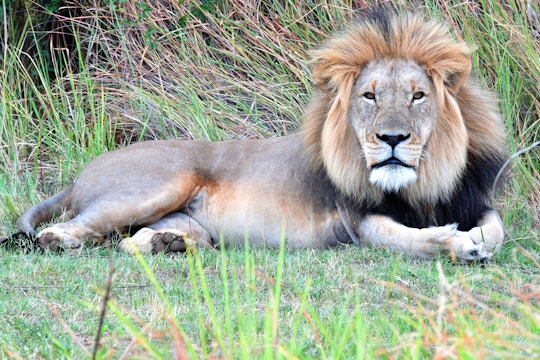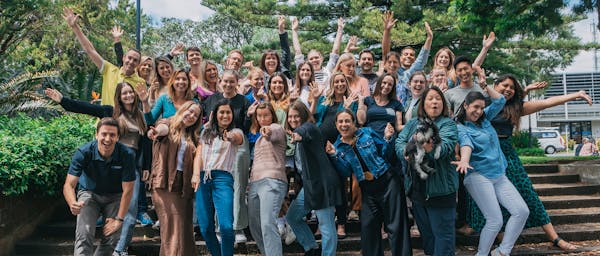Embark on a transformative journey through the breathtaking Himalayas with our 14-day Everest Base Camp Trek. This iconic expedition isn't just a trek; it's an opportunity to challenge yourself, immerse in Sherpa culture, and witness awe-inspiring vistas that will leave you speechless.
In addition to completing the mighty journey to Everest Base Camp, you will visit an ancient monastery in Tengboche, and enjoy stunning views of Mt Lhotse, Mt Makalu, and Cho Yo. Amidst all the rugged mountains vistas, you will also see the Khumbu Glacier and ascend the famous Kala Pathar for a close, unobstructed view of Mt Everest.
This trek begins on the first and third Sunday of each month; however, if you are looking to join outside of this time, please let your IVHQ Program Manager know and they will be happy to check availability for you.
Itinerary:
Day 1: Arriving at The Capital – Kathmandu (1400 m), where you will spend the night in a local hotel
Day 2: Fly to Lukla (2860 m) and Trek to Phakding (2610m) Trek duration 3-3.5 hours
Day 3: Phakding to Namche Bazar (3440 m) Trek duration 5.5 hours
Day 4: Acclimatization at Namche Bazar
Day 5: Trek to Tengboche (3860 m) Trek duration: 5-6 hours
Day 6: Trek to Dingboche (4350 m) Trek duration: 5 hours
Day 7: Acclimatization at Dingboche
Day 8: Trek to Lobuche (4910 m) Trek duration: 5 – 5.5 hours
Day 9: Lobuche to Gorak Shep (5180 m) – Everest Base Camp (5365 m) Trek Duration: 8 hours
Day 10: Gorak Shep to Kala Patthar (5545 m) and to Pheriche (4243 m) Trek duration: 3 hours + 4 hours
Day 11: Pheriche to Namche Bazar Trek duration: 6-7 hours
Day 12: Namche Bazar to Lukla
Trek duration: 7 hours
Day 13: Flight from Lukla to Kathmandu and stay the night in a local hotel
Day 14: Departure Day
Important things to note:
Price - The price is quoted for 7 or more volunteers taking part on the tour. If there are fewer volunteers taking part on the tour, the cost will be higher. Any difference (between $20 and $290) will need to be paid directly to the local team in-country before starting the tour. You will be notified at your program orientation if there is any extra amount to be paid. Your Program Manager can provide more information on the potential cost based on numbers of volunteers participating.
Expect the unexpected - The weather and health of fellow trekking members can impact the number of days it takes to complete the trek, therefore we recommend allocating 1-2 days extra to ensure you will make your international flight home. January & February can be very cold.
Accommodation - You can expect to stay in local run lodges known as tea houses which are simply furnished with a bed and occasionally a small table. Bathrooms are typically shared and are in a separate area of the teahouse or in some tea houses will be outside. Staying in a teahouse is a great way to support these local businesses and boost the local economy in the Everest Region. You will need to bring a sleeping bag with you.
Meals - You will be doing “teahouse trek,” meaning there are villages with lodges and restaurants to eat and stay in along the entire route. You are expected to eat breakfast and dinner in the same lodge where you are spending the night. Typical food available for lunch and dinner is Nepali rice and lentils, pasta, potato dishes, soups or pizzas. Delicious pancakes, porridge, toast and eggs are the main breakfast fare, while tea, coffee and hot chocolate are always available. You will probably be pleasantly surprised at the variety of food at the lodges.
Level of fitness required - There are a lot of steep ascents and descents on the trek and a good level of fitness is required. Some days you may be required to walk up to seven hours. Please note that the estimated walking time each day will vary according to the overall fitness of the group and weather conditions.
Packing list - Bring well broken-in hiking shoes that are suitable for snow, thick socks, light socks, camp shoes (e.g. flip flops or sandals), down or fibre filled waterproof jacket and pants, sweater or fleece jacket, underwear, warm and cotton or polypropylene pants or jeans, shirts and T-shirts, shorts, wool hat, sun hat/cap, gloves, bathing suit, comfortable track/gym suit, sunglasses, sunscreen (SPF 50), elastic knee brace, ear plugs, wallet, books or kindle, head torch, basic first aid kit and personal medication, extra batteries for camera and gadgets, cables and chargers, toiletries (toothbrush, toothpaste, sanitizer, etc.).
Travel insurance - Although the itinerary has been made accordingly so that the trekker's body slowly gets used to the altitude, it is important to note that you will be at the altitude of approximately 5545m at the base camp. The risks of trekking at a high altitude are significant; therefore, it is essential to note that most standard travel insurance packages do not include high-altitude trekking. As such, please be aware of the approximate altitude of 5545m when obtaining travel insurance, as you will need to ensure you are covered for all altitude related illnesses (including helicopter rescues).
Tips - There is generally a minimum US$100 tip required for the Everest Base Camp Trek and this will be paid to the relevant guide/s once in-country.
Cancellation - It is worth noting that any cancellations within 14 days of your start date for the Everest Base Camp Trek may incur a cancellation fee.
You will be responsible for:
- Any difference in the cost, based on the number of people joining - please see 'Price' point above
- Personal expenses (beverages, laundry, tips, phone calls, hot showers, extra snacks, etc.)
- Items to pack - please see 'Packing list' point above
- Sleeping bag
- Medical evacuation in case of emergency
- Trekking gear (available to hire)
- Unforeseen costs due to flight cancellation, weather conditions, illness, political unrest, etc.
- Meals in Kathmandu
- An extra night of accommodation (on the Saturday night) if joining the trek prior to your volunteer program starting may be required - this can be booked directly via the Local Team if it is required
- Insurance (up to 6,000 meter altitudes) - should also include coverage for medical evaluation, repatriation and medical expenses during the trek
- Tips - this is generally a minimum of US$100 for the Everest Base Camp Trek.
Please note, this is not confirmed by the Local Team until payment has been made.
...


























































